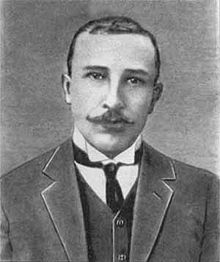Boris Savinkov
This article includes a list of references, related reading, or external links, but its sources remain unclear because it lacks inline citations. (April 2009) |

Boris Viktorovich Savinkov (Russian:Борис Викторович Савинков) (19 January 1879 - 7 May 1925) was a Russian writer and revolutionary terrorist. As one of the leaders of the Fighting Organisation of the Socialist-Revolutionary Party, he was responsible for the most spectacular assassinations of imperial officials in 1904 and 1905.
Later, he became Assistant War Minister in the Provisional Government. Savinkov emigrated in 1920, but in 1924 he made an endeavour to return to Russia, was arrested and either was killed in prison or committed suicide.
Young years
Savinkov was born in Kharkov (Kharkiv), the son of a judge in Warsaw. In 1897 he entered the law department of St. Petersburg University but was expelled in 1899 because of participation in students' riots. Later he studied in Berlin and Heidelberg. Since 1898 he was a member of various socialist organizations. In 1901 he was arrested and sent to exile to Vologda. He served the exile with some prominent Russian intellectuals including Nikolai Berdyaev and Anatoly Lunacharsky. However he became disappointed with Marxism and shifted to terrorism. In 1903 Savinkov escaped abroad and joined Socialist-Revolutionary Party, where he soon became Deputy Head of its Combat Organization under Yevno Azef.
Socialist-Revolutionary Party
For his assassination of Russian Minister of Interior Vyacheslav von Plehve and participation in the assassination of Grand Duke Sergei Alexandrovich of Russia, he was arrested in 1906 and sentenced to death. However, he managed to escape from his prison cell in Odessa and found refuge in exile. When Azef was revealed as an agent of the Okhrana in 1908, Savinkov became the head of the Fighting Organization, but it was too weak to conduct any serious operations. While in France Savinkov participated in World War I as a volunteer in the French Army. He returned to Russia in April 1917, several months after the February Revolution, and in July became Deputy War Minister under Alexander Kerensky. However, on August 30 he resigned from the government and was expelled from the Socialist-Revolutionary Party due to his role in the uprising of General Lavr Kornilov in September 1917. He remained in Russia as a counter-revolutionary during the period after the October revolution.
Civil war
As a leader of the Society for Defence of Motherland and Freedom, Savinkov inspired several armed uprisings against the Bolsheviks, most notably in Yaroslavl, Rybinsk and Murom. After these were crushed by the Red Army, Savinkov returned to France. There, he held various posts in the Russian emigre societies and was the main diplomatic representative of admiral Aleksandr Kolchak in Paris. During the Polish-Bolshevik War of 1919-1920 he moved to Poland, where he formed a Russian political organisation responsible for the formation of several infantry and cavalry units out of former Red Army POWs. Together with Merezhkovsky, he published in Warsaw a newspaper entitled «За свободу!» ('For Freedom!). In October 1921, when Polish-Bolshevik War was over, Polish authorities sent Savinkov out of the country in order not to spoil relations with the Soviets.
Trust Operation and death
He was an acquaintance of Sidney Reilly, the legendary renegade British agent, and was involved in a number of "counter-revolutionary" plots against the Bolsheviks, sometimes collaborating with the British Secret Intelligence Service (SIS). These efforts were effectively undermined by the Trust Operation implemented by OGPU. Savinkov was lured into the USSR to meet with false conspirators and consequently arrested. The USSR Supreme Court sentenced him to death but the Presidium of VTsIK converted the sentence into 10 years imprisonment. During his trial Savinkov declared that he recognized the Bolsheviks and assumed his defeat. While imprisoned he wrote satirical stories about white emigrés, and was allowed to see them published in Moscow. According to the NKVD he committed suicide by jumping from a window in the Lubyanka prison, in Moscow. However, according to modern publications by Aleksandr Solzhenitsyn and others, Savinkov had been killed in prison by OGPU officers.
Legacy
Boris Savinkov wrote several novels. His most famous are an autobiography "Memoirs of a Terrorist" and a loosely autobiographical novel called "Pale Steed". Savinkov's works raised huge controversy among SR's. Many of them disclaimed them as "spoofs" on terrorism.
Movie
2004: Karen Shakhnazarov directed a movie The Rider Named Death, based on Savinkov's book.
Works
- Pale steed, 1909, Template:Lang-ru
- That what haven't been, 1912 Template:Lang-ru
- Memoirs of a terrorist, 1917, Template:Lang-ru
- Black steed (novel), 1923 Template:Lang-ru
